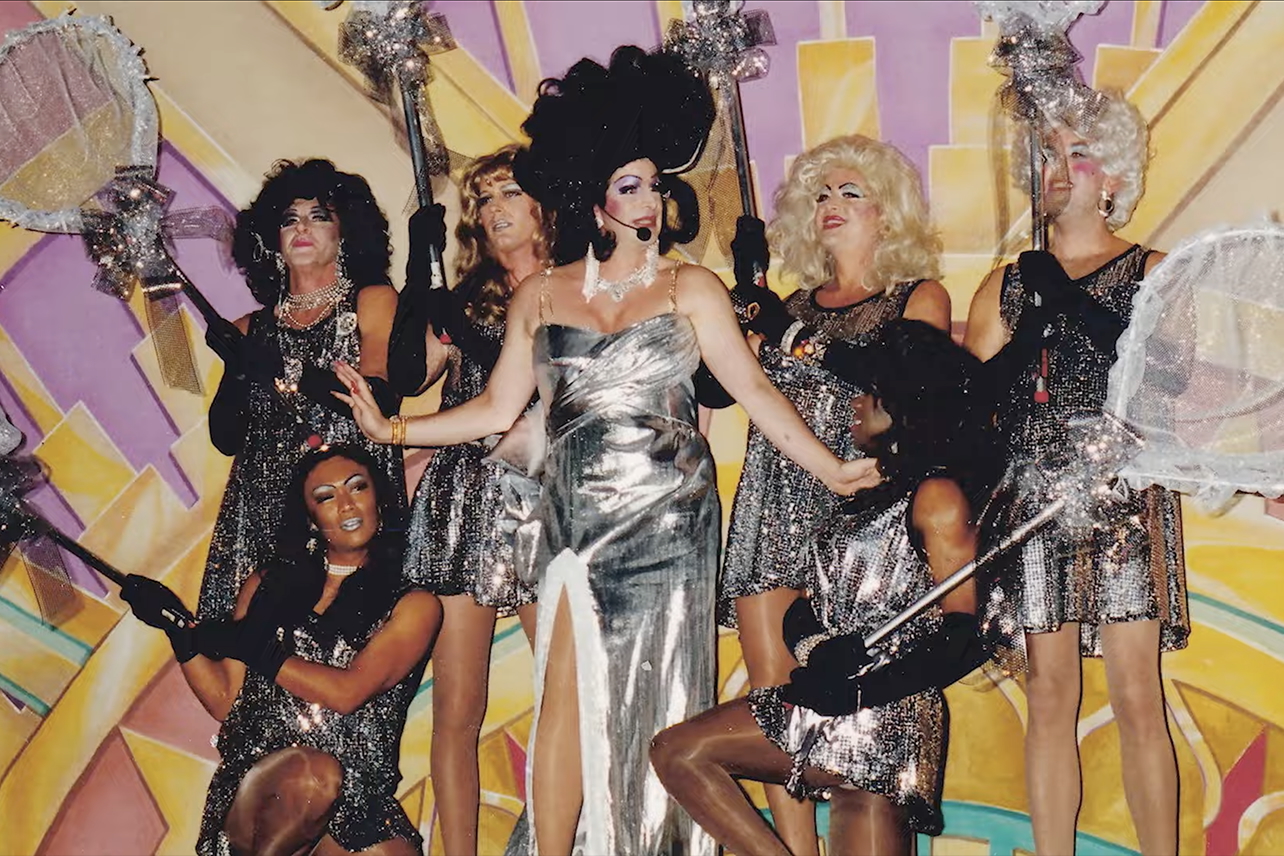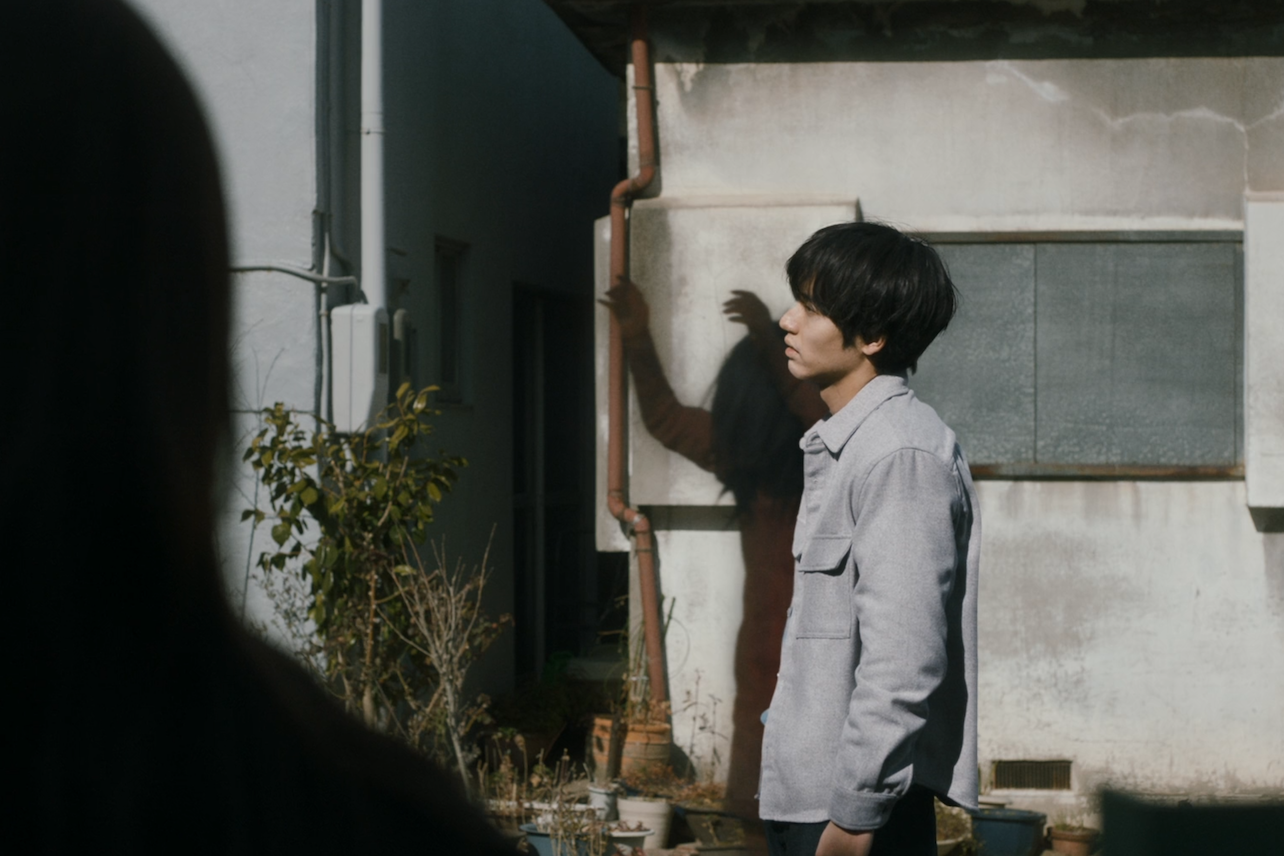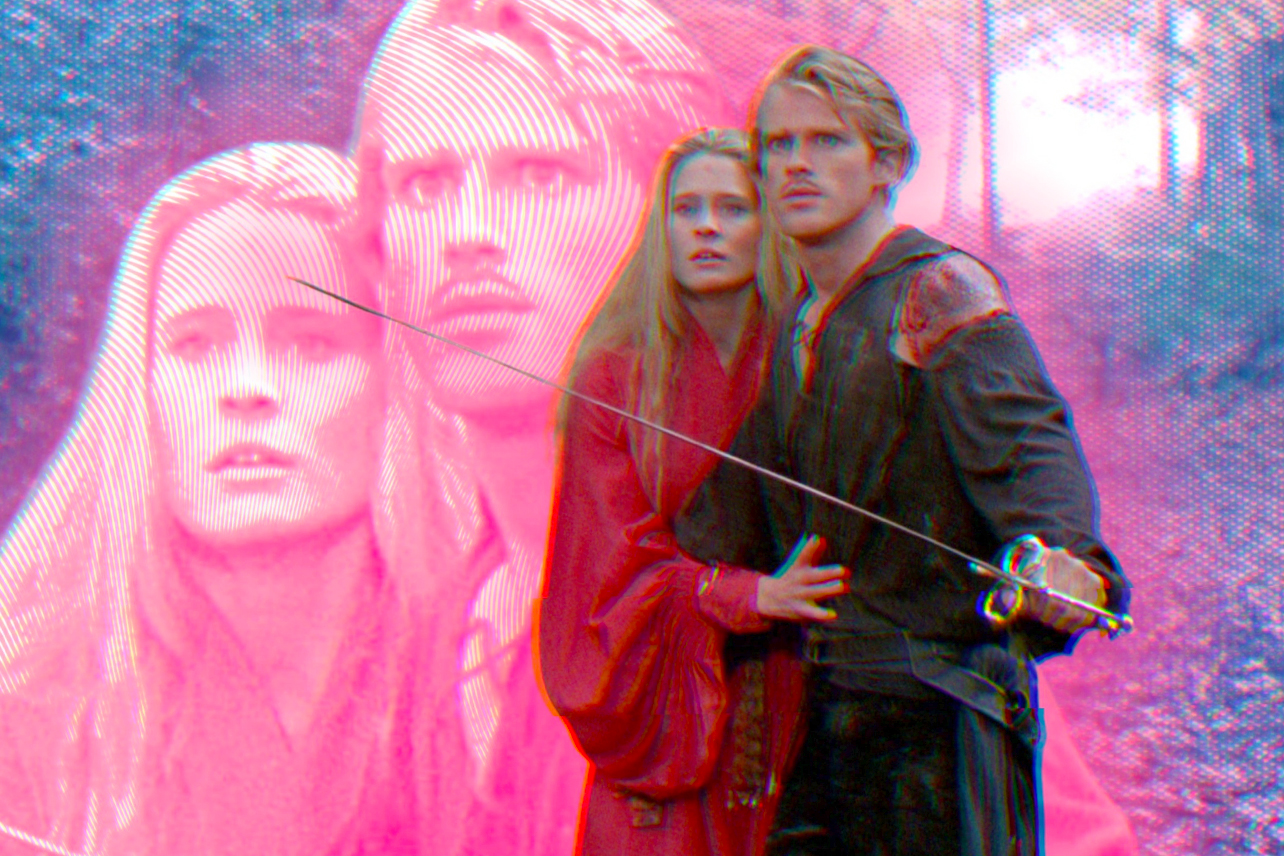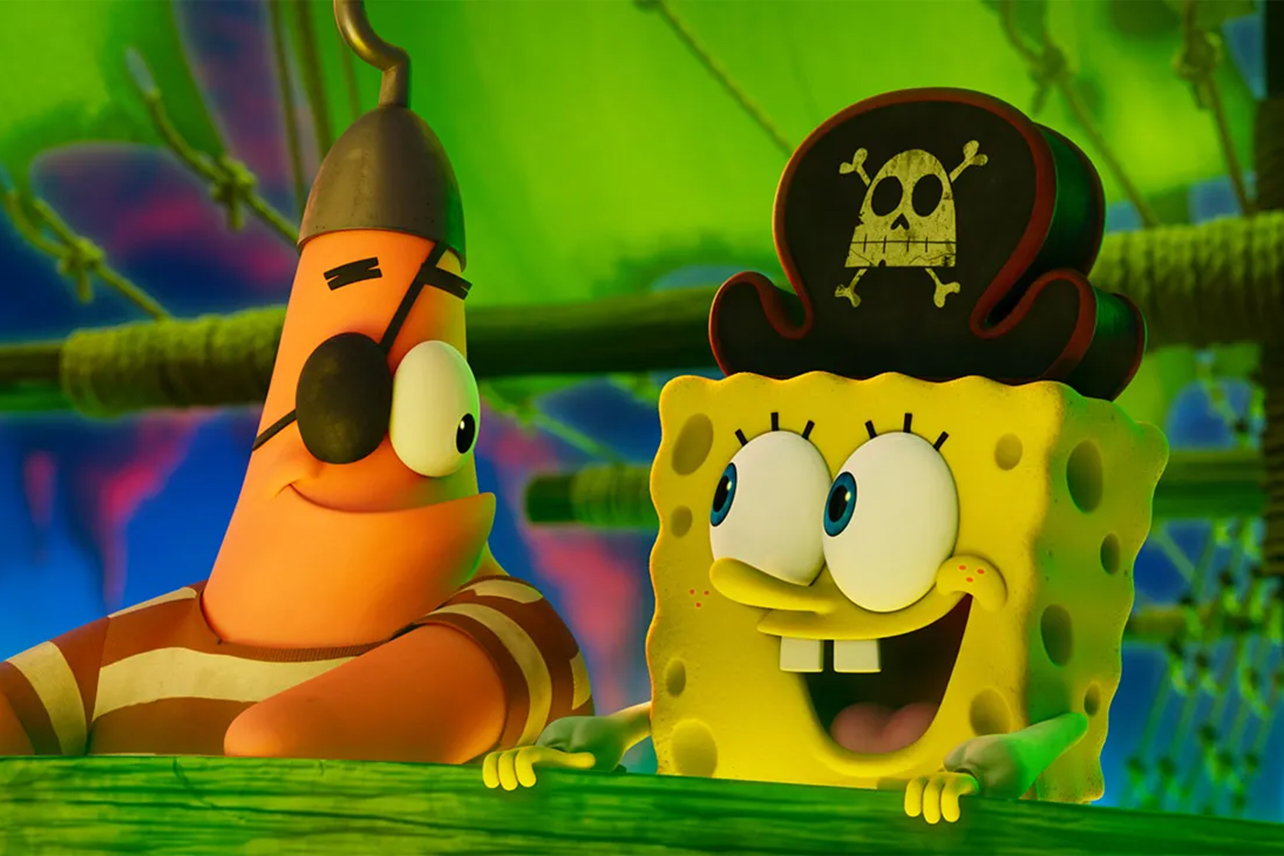Drag is more than a fad. It's more than a hot topic or a scapegoat. It's more than a reality show, or two reality shows, or twenty reality shows. Drag is not just this moment. Drag is all of that — and drag is history. Drag is decades of queer history, layered like sedimentary rock, form a solid foundation for current and future generations to dance, sashay, or march upon. The generational power of drag is on full display in the new documentary The Little Pageant That Could, now streaming on WOW Presents Plus.
The documentary chronicles the first 30-ish years of the Best in Drag Show pageant, a fundraiser started by one Alexis Pittman in 1989, initially in an apartment as a small event amongst friends to commemorate the annual Miss America pageant. A last-minute addition to the event: a donation jar for causes fighting the AIDS episdemic. Over the next decade, the pageant grew in size, popularity, and importance as it brought awareness and thousands upon thousands of dollars of donations for AIDS-related causes.
The Little Pageant That Could chronicles the ups and downs of putting on a drag pageant, one where queens keep one-upping each other with increasingly outlandish characters, outfits, and numbers. But what makes The Little Pageant That Could a must-watch is the way it depicts the push and pull between tragedy (so many of the founders and queens are gone today, many due to AIDS-related illness) and comedy (you will believe that a drag queen can call in a favor and get a camel onstage!). The film showcases a kind of strength that is emblematic of the community it documents: we fight back in any way we can, whether that's through political action, fundraising, wearing gorgeous dresses, or all three at once.
With The Little Pageant That Could now available to stream on WOW Presents Plus, Pop Heist had the opportunity to talk to director John Carlos Frey about bringing this story — a story he lived through — about LGBTQ perseverance to the world at a time when we need it the most.
Brett White: I just watched the documentary and I laughed, I cried — I feel like you're probably hearing that a bunch.
John Carlos Frey: Those are all very good things to hear. I mean, I'm sorry about the cry part, but that's that's on purpose. I think if you cry, you laugh harder after you cry. So, yeah,
That speaks to a thing about drag that your documentary really gets to: when you make someone laugh, you're getting their guard down, and that's when you can really hit them with some emotional stuff.
You're revealing my secrets!
But that is what this documentary so effortlessly captures, drag's ability to lower defenses and then really get a message across. How much was that at the forefront of your mind while making this?
One hundred percent. I came to this world as a very scared gay man, and one of my first confrontations with the gay world was drag, and it scared the shit out of me. I thought that the longer I stayed gay, the more I'll probably have the desire to put on a dress. I really thought that I was going to feminize myself, and I hated this idea that I was going to become that. And then I immersed myself in it, because they asked me to help them with one of these productions — and I fell in love with these men. They taught me not necessarily how to be gay, but how to be a man.
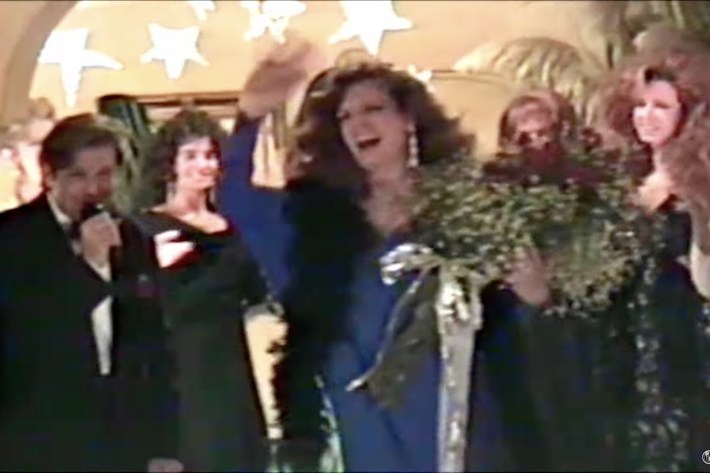
These were men who were fighting for their lives at that time. These were men who, at that time, were being ostracized. A lot of them did drag because, for the most part, they felt most comfortable in drag. They didn't seem to fit in unless they were a hairdresser or unless they were a florist or something like that. There was a lot of discrimination, a lot of ridicule, and they were tough guys and it filtered into their drag. Their comedy was razor sharp. They didn't put up with shit. They knew who they were. They were confident in their own skin. They went in the direction they wanted to go in. And then you put on top of that the AIDS crisis. I learned how to be a man, how to be responsible, how to grow up, how to not let people fuck with me. It was a big shock to me that those were the individuals who are going to teach me how to grow up.
How long were you yourself involved with the with the with the pageant?
I'm not involved with the pageant now and I haven't been for a long time, but when the show started in someone's living room, I lived in the same apartment complex. I was there and watched it. That's the story I was just relaying: I'm with a bunch of guys that want to dress up in drag and watch Miss America. It scared the crap out of me. As long as it was in a living room, it was fine, it was campy, it was funny. It lasted an hour, and that was that. And then they decided to move it to a theater. I was an actor at the time. I had theater experience. I knew how to run lights and sound and hook up microphones and spotlights and all that kind of stuff, so they asked me to basically run all the tech. We didn't have anybody to choreograph the show. I'm not a choreographer, and I had eight drag queens who needed a little structure on how to perform on stage, so I became the show's director the first time it was on a stage outside of someone's living room. And then every year it grew. We started getting into bigger theaters, and I stayed as the director. And I honestly think that my career today as a filmmaker, as a director, and a director of this documentary started there. It gave me the chops to go out in the world.
When did you decide to make the documentary?
It was around the pandemic. I wasn't working and no one was working. We're all sitting around with nothing to do, and this idea of a documentary for this pageant had been pushed around for years. There have been a couple of attempts. One of the reasons we have so much archival footage is because some guys decided to make a documentary and it never got off the ground. So there were just buckets of DVDs and tapes of interviews and filming of the show. I had a career as a documentary filmmaker by the time the pandemic rolled around, and they said, "Can you do something with this?" The emcee, the host, the director, the people associated with the show are all aging. They may not be doing the show much longer. What better time to do it than during the pandemic? So that's what we did. I went through 33 years of that show. People had VHS tapes and DVDs and recordings off of a television screen, and all the stuff that you see in the film, which is amazing because we grew up in a time where everybody still had a video camera. At some point everybody had a video camera, and it was in the '90s.
I really relate to what you said about drag being terrifying. That's how RuPaul's Drag Race felt to me when I first saw it. And then watching the documentary, I see so much of what Drag Race is in what the pageant was and is. That's why I find it so cool that this is on WOW Presents Plus alongside so much Drag Race. How did World of Wonder get involved?
I knew that we had something after seeing all the footage. As a filmmaker, the hardest thing to do is to get distribution. You can make a great film. Who's going to see it? I put together a 45 minute teaser reel, a whole bunch of the great performances, the elephant and the camel and pratfalls and all of this crazy, wacky stuff in a long trailer. Obviously with some interviews and story lines, but just to show the depth of footage that we had. I got an appointment with Randy Barbato and Fenton Bailey, the owners of World of Wonder, and we sat down and screened it, and they fell in love with it. I had a little bit of money to produce the interview part of it, but I didn't have enough money to finish it, so they helped with the post-production and finished the film for me.
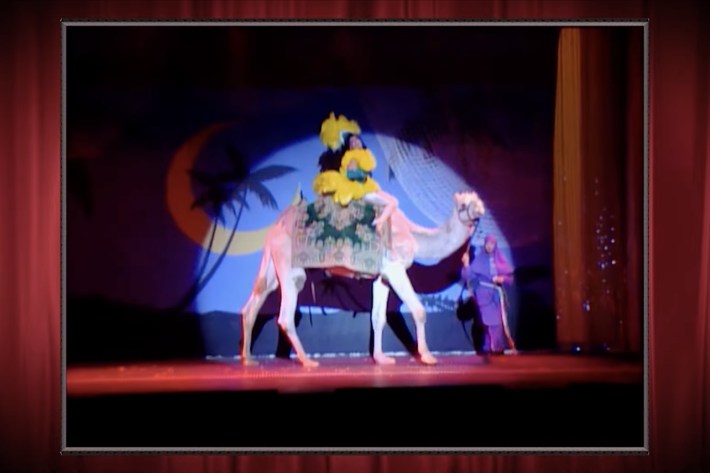
How do you feel about this documentary introducing our gay history, drag history, to a new audience?
I want this to be an iconic, historic film. There's not a lot of gay history, drag history about Los Angeles. Usually when you go to the West Coast, you think about gay history, you think about the early days in San Francisco. The AIDS crisis is always centered around San Francisco or New York, with things like Wigstock and Paris is Burning, those kinds of iconic films about our history. I pleaded with Fenton and Randy to give it that sheen, to really go through the history and the timeline and what was going on historically at the time, and what was drag back then, and how these individuals were fighting. It gets kind of heavy when we're talking about AIDS, but drag was, I think, probably in its infancy as a voice for the gay community around the AIDS crisis. It was a way that we could laugh at ourselves. It was a way that we could fight back without being persecuted. It was a way that that we could speak out against politicians and against the government. And it was powerful. It was activism, but just wearing a dress.
I really appreciated that this documentary emphasizes that Ronald Reagan did not address AIDS for years, and it wasn't even addressed by the White House until a reporter brought it up in a press briefing — and the reporter was mocked. Thank you for including that history.
I'm a journalist like you, so the spine of this thing is to get some real facts. The documentary would be fun and campy if we just showed all of the footage of the actual pageant, but to root it in history makes it mean that much more, that these guys were fighting the entire time, and the reasons for raising money were very clear: because their friends were dying. So all of that stuff really needed to be there.
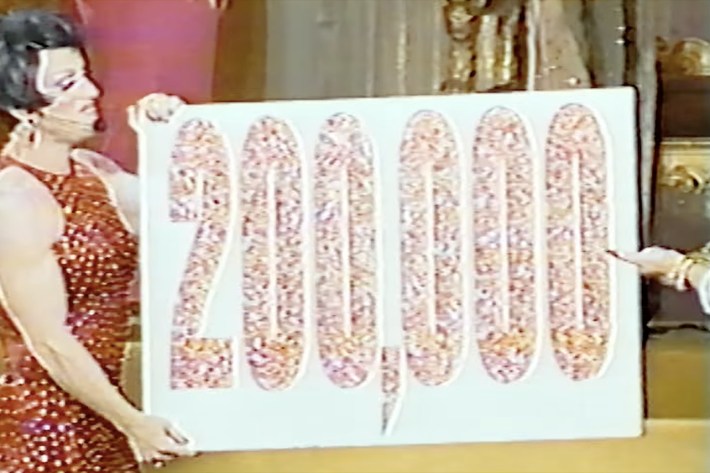
What also hit me is the news coverage of the pageant at the time, which was very lighthearted and fun — and it seemed to illustrate how much we've gone backwards in just the last few years.
I don't think drag back then was threatening. It was fringe, it was on stage, it was in West Hollywood. It wasn't what it is today, which is a powerhouse. Drag is elevated. Drag is big all across the country, so I think it feels more threatening today, that you're going to indoctrinate your children and turn them all into drag queens or whatever it is. But back then, the only time you could see it was either at a bar late at night or this particular pageant. So I think you're right. I also think that Los Angeles, at that time, and maybe even still today, was pretty tolerant. There were a lot of celebrities. This was performance art. So I think that the LA journalists that covered it didn't cover it necessarily as a gay thing. It was more sort of as a comedy night.
I was also shocked every single time a new A-list celebrity popped up, like Julia Louis-Dreyfus, Christina Applegate.
I mean, the people that we didn't put in — Chris Pratt was there. I think what happened at that time is Elizabeth Taylor sort of became the spokesperson for the AIDS crisis and made it okay for celebrities to come forward and support that community. The host of the show, Patrick Rush, was a big time casting director back in the day when the show started. So he knew all of these people, or he knew the agents who had these people. And back then, it was somewhat popular to become associated with the AIDS crisis as well.
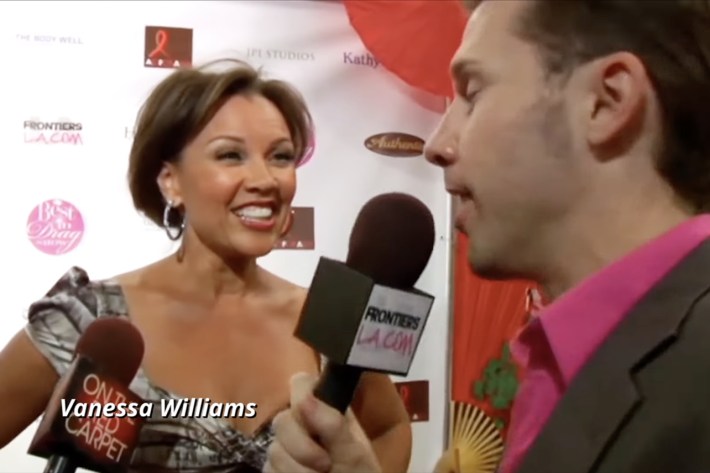
Now that the documentary is out in the world, how do you view its arrival in this historical moment? Do you see any symbolism in that?
It's on purpose. I won't stop talking about it, and I'll speak out about what the current administration is doing to us. I mean, if they're going to ban books and ban library storybook hour, and think that drag is some kind of indoctrination, anti-Christian or of the devil, this film speaks. So this was on purpose to get this out. The entire campaign through the film festival circuit is sort of an answer and a call back to, look what these people did 30 years ago. We can rely on ourselves. We can build our own community. We can empower ourselves to make a difference. Fuck the administration if they want to come after us. We've got teeth now, so just go try. It. The comments that I'm starting to see on social media about the film, because it's only been out for like a week, are kind of like that. "We really need to see this. We need our young people to see this." It teaches the people who are already standing on our shoulders what it was like.
I know as a journalist and critic, having to cover media about the AIDS crisis can be really emotionally draining, even as you're trying to remain objective or professional. It gets heavy doing this work. In making this documentary and going through all that footage, reliving this history, how did you take care of yourself?
You're assuming I did take care of myself.
I hope you did!
No, I'm a wreck! I'm a wreck. The people who are in the film are my best friends. I've watched this thing 962 million times, over and over and over again, because I directed it. I know every frame of this film and every time I watch it — and I'm not embellishing here, Brett, I'm telling you the absolute truth — I bawl my eyes out. I was at the premiere a week and a half ago and I'm sitting with the audience, and I've seen this thing. I know what's coming next. I know the music cues. I know what they're going to say, and emotions just come up. I've lost so many people. I don't want that feeling to go away. I want that to empower me. I want that to inform my decision making. I want to feel those feelings because I don't want to pretend it didn't happen. So I'm okay, and I know what it's like to inject that into an audience. You have to be careful. I noticed people during those moments where it's a little heavy to watch with some of those graphic pictures and images, people getting up to go to the bathroom — "this is too much." But that's why we come right back with a big pratfall or comedy, to get to calm people down a little.
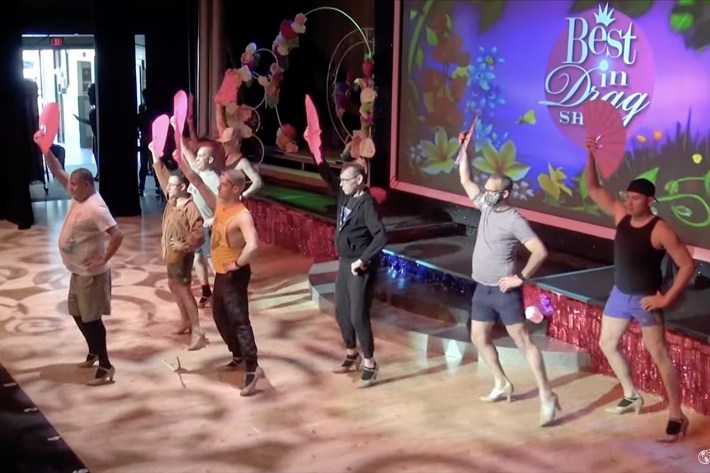
Yeah, I would get really emotional, and then I would be like, "How did they get an elephant on stage?! Who do you call to get an elephant?" Were there any crazy, big performance moments that didn't make it into the doc?
God, there were so many. There was Salina EsTitties, who was a RuPaul's Drag Race girl. She was a contestant one year in the pageant. She played a pregnant Latina who gave birth on stage, and before she gave birth, she popped ping pong balls out of her vagina. That did not make it, mostly because the filming of it, whenever, whoever was filming it that year, didn't do a very good job. We couldn't quite tell what was happening, so we had to cut that out. We had a trapeze act one time where somebody was on cables flying through the air. They were a drag queen as Peter Pan, and the wires got caught so they never really got to take off. They're kind of hanging half upside down for like 30 seconds until the curtain comes back down.
Early on, a lot of these queens didn't know how to put on tits, didn't really know how to put on makeup, and so by the end of the show, their makeup is melted off and their tits are sagging down to their belly buttons. It goes on and on. The film now is 90 minutes, and we have 33 years of footage, so most of it didn't make it.
When people watch this documentary, especially young people, what do you hope it inspires them to do?
The thing that I feel when I watch it, and the people that I've screened it for personally, feel empowered. I don't think that a government or a Christian body or even an individual who shits on drag queens or on our community has any credibility anymore. We have so empowered ourselves. We have voted in candidates, we have moved legislation, we have forced gay marriage onto the world, etcetera. So I'm hoping that they get a sense of who they are and that they have their own individual power source, because that's what this film is about. These people didn't take no for an answer. The fact that their friends were dying all around them, they didn't lay down. They went in and they fought how they knew to fight. And I'm hoping that viewers come back with some source of empowerment, especially a younger person who might be discriminated against or feel like they don't belong. I'm hoping that it can carry that message. That's a big hope, but you know, if they can come away with that, that would be amazing.
The Little Pageant That Could is now streaming on WOW Presents Plus
If you haven't already, consider supporting worker-owned media by subscribing to Pop Heist. We are ad-free and operating outside the algorithm, so all dollars go directly to paying the staff members and writers who make articles like this one possible.
